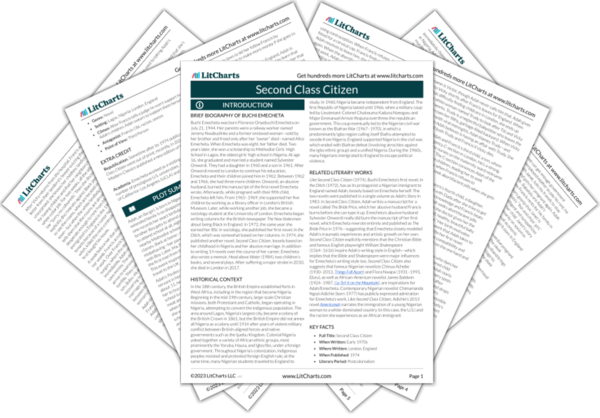In Second Class Citizen, people often treat education as a mere stepping-stone to good credentials and economic security. Yet the novel also shows that when people take formal and informal education seriously as a life-long project, they attain fulfillment and happiness that goes beyond mere economic security. The connection between education, economics, and happiness is clear in the life of the novel’s protagonist, Adah, a young Nigerian woman who immigrates to the UK in the 1960s. During her childhood in Nigeria, Adah sneaks off to attend school because her younger brother Boy is allowed to go while she is not: her jealous motives suggest that she sees education as a stepping-stone to earning greater respect and security as a girl in a frequently misogynistic culture. At some point, however, Adah begins to aspire to become a writer. After this point, she pursues a degree in librarianship to get closer to books, in preparation for a future artistic career. Rather than continuing her education in the UK, Adah works as a librarian to support her husband Francis and their children. Yet her informal education, conducted through reading novels, brings her great joy—and the novel manuscript that she eventually writes as a result of her formal and informal educations, The Bride Price, brings her such fulfillment that she compares it to giving birth to a baby. Thus, the novel suggests that education is a good thing because it can help people achieve economic security—but a great thing because it can help them attain higher aspirations and true happiness.
Economics vs. Aspiration in Education ThemeTracker

Economics vs. Aspiration in Education Quotes in Second Class Citizen
She was not even quite sure that she was exactly eight, because, you see, she was a girl. She was a girl who had arrived when everyone was expecting and predicting a boy. So, since she was such a disappointment to her parents, to her immediate family, to her tribe, nobody thought of recording her birth. She was so insignificant.
These groups of men calculated that with independence would come prosperity, the opportunity for self-rule, poshy vacant jobs, and more money, plenty of it. One had to be eligible for these jobs, though, thought these men. The only place to secure this eligibility, this passport to prosperity, was England. They must come to England, get a quick degree in Law and go back to rule their country. What could be more suitable?
But the one thing Adah could not stand was when a group of people took a portion of the Bible, interpreted it the way that suited them and then asked her to swallow it like that, whole. She became suspicious. She did not mind it if Francis believed it, except when it disturbed his studies or if either of the children needed a blood transfusion and he refused.
Francis was so happy and was coming over to her cane chair, kissing her very, very softly, telling her how virtuous she was and how he now was the lord and master of several farms, miles and miles around. What more could a man want than a virtuous wife like her who had helped him achieve all this?
She worked out a timetable, and found that she could manage to have three hours of quiet each afternoon. Then her old dream came popping up. Why not attempt writing? She had always wanted to write. Why not?











